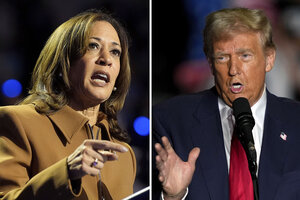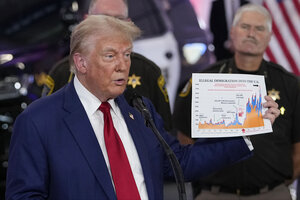Joe Biden exits the race. How hard is it to change the Democratic ticket this late?
Loading...
| Washington
President Joe Biden announced Sunday that he is dropping out of the 2024 presidential campaign following weeks of mounting pressure after his poor debate performance June 27. Mr. Biden endorsed his vice president, Kamala Harris, to become the nominee.
From a logistical perspective, Vice President Harris is the best-positioned to take over the existing campaign apparatus and the only one who can use Biden-Harris campaign funds. Still, her nomination – while the easiest path forward for the party – is not guaranteed.
Why We Wrote This
After weeks of hand-wringing about whether replacing Joe Biden on the 2024 ticket would do more harm than good, Democrats are now turning to how to make the switch as seamless as possible.
The focus has now turned to how exactly it will work to replace Mr. Biden as the Democratic choice to be the nominee.
Nearly 4,000 delegates to the DNC are pledged to Joe Biden, but they are not legally bound to support him if in good conscience they decide it’s in the interest of their states or voters to elect someone else. If there’s not a consensus on the first ballot, superdelegates – including Democratic governors and members of Congress – could also join in the voting.
The last time a Democratic candidate didn’t get the nomination on the first ballot was 1952.
[This story, originally published July 8, 2024, was updated July 21 to reflect President Joe Biden’s dropping out of the 2024 election campaign.]
President Joe Biden announced Sunday that he is dropping out of the 2024 presidential campaign following weeks of mounting pressure after his poor debate performance June 27.
“It has been the greatest honor of my life to serve as your President,” he wrote in a letter posted on his official X account. “And while it has been my intention to seek reelection, I believe it is in the best interest of my party and the country for me to stand down and to focus solely on fulfilling my duties as President for the remainder of my term.”
Why We Wrote This
After weeks of hand-wringing about whether replacing Joe Biden on the 2024 ticket would do more harm than good, Democrats are now turning to how to make the switch as seamless as possible.
In a separate post on X shortly after issuing the letter, Mr. Biden endorsed his vice president, Kamala Harris, to become the nominee. That makes Ms. Harris, a former senator and attorney general of California, the clear front-runner. She struggled as a presidential candidate in the 2020 cycle, dropping out before the primary season began. But allies say the experience she has gained during a bumpy tenure as vice president will make her a stronger candidate now.
From a logistical perspective, she is the best-positioned to take over the existing campaign apparatus and the only one who can use Biden-Harris campaign funds. Still, her nomination – while the easiest path forward for the party – is not guaranteed.
The focus has now turned to how exactly it will work to replace Mr. Biden as the Democratic choice to be the nominee.
There were three main scenarios under which Mr. Biden could have been replaced on the ticket. The most straightforward is the one the president chose: Mr. Biden exited the race ahead of the Democratic National Convention (DNC), set to be held Aug. 19-22 in Chicago. Alternatively, he could have been replaced by another candidate at the convention. The thorniest path would have been if he stepped down after the convention.
By stepping down now, Mr. Biden has given his party the least messy and potentially least divisive path.
Who chooses the nominee?
There is a widespread perception that primary voters directly choose presidential candidates, but that’s not quite true. Voters in state primaries and caucuses cast their ballot for the candidate they like best. But the nominee is elected by delegates to the party convention, who are chosen based on primary or caucus results in their state.
Within the Democratic Party, 3,896 delegates have pledged to support Mr. Biden at next month’s convention, 36 are uncommitted, and seven support other candidates, according to The Associated Press delegate tracker.
Per DNC rules, delegates “shall in all good conscience reflect the sentiments of those who elected them.”
Mr. Biden has facilitated the process by withdrawing ahead of the convention, and endorsing a replacement – albeit with only a month to go until the party convenes in Chicago.
How will the balloting go as President Biden steps aside?
Now that Mr. Biden has stepped down, a new candidate – whether Ms. Harris or someone else – will have to try to win over a majority of the Democratic Party’s delegates.
If a candidate wins that majority on the first ballot, he or she will become the party’s nominee. The most straightforward replacement for Mr. Biden is the vice president, but other names have also been floated. The party would also need to agree on a vice presidential nominee.
If no candidate wins on the first round for presidential nominee (something that hasn’t happened since 1952), voting would be opened up to 739 superdelegates, who are not pledged to any candidate. These superdelegates, also known as “automatically seated delegates,” include all Democratic members of Congress and Democratic governors, as well as other party leaders.
Under a more dramatic scenario, if Mr. Biden had refused to step aside but many in the party had remained intent on finding another nominee, a candidate could have challenged him at the convention by trying to convince more than half of the delegates to vote for him or her instead.
Would the nomination still get on all 50 state ballots?
Alabama, Ohio, and Washington all have early deadlines for confirming the nominee for each party. Ohio’s was originally slated for Aug. 7, nearly two weeks before the Democratic convention starts. To work around this, the DNC set plans in motion to nominate its candidate via virtual roll-call votes before the convention.
The Ohio deadline was then pushed back during a special legislative session in May, and the two other states also adjusted their timelines. Prior to Mr. Biden dropping out, the DNC had planned to go forward with the early roll-call votes – although in the wake of Mr. Biden’s rocky debate performance, some delegates asked for more time. It was unclear as of press time whether Mr. Biden’s decision to exit the race would change the DNC’s plan.
Had Mr. Biden accepted the nomination and then decided to step aside later, this could have caused Democrats to run up against state ballot deadlines, creating a sticky path forward for the new nominee.
But the party’s replacement effort could still face legal challenges. Even before the June 27 debate, the conservative Heritage Foundation said it would challenge a potential Biden withdrawal in court. The group argued in a memo, posted on the social platform X, that litigation could delay or thwart getting a new nominee on the ballot in at least some states. As speculation of a Biden drop-out mounted in recent days, GOP Speaker of the House Mike Johnson – a constitutional lawyer – said that in states where the switch could be legally contested, he expected it would be.
Would a new nominee be able to tap Biden campaign funds?
The Biden Harris campaign had $91 million on hand at the end of May, the most recent tally available from the Federal Election Commission. In early July, the campaign announced that June marked its strongest fundraising month yet this cycle, with a total of $240 million now at its disposal, counting funds from the Biden for President organization, the Democratic National Committee, and joint fundraising committees.
Now that Mr. Biden has left the race, the only potential nominee who could directly inherit that campaign money is Vice President Harris. If someone other than Ms. Harris were nominated, Mr. Biden’s campaign funds could be donated to the DNC or a political action committee (PAC). However, the rules on how PAC money can be used would significantly limit the extent to which those funds could be tapped by another candidate.
Has anything like this happened before?
The most analogous situation may be the last open convention the Democratic Party had, in 1968. That year, President Lyndon B. Johnson, facing mounting protests over the Vietnam War, dropped out of the race partway through the primary season. But Mr. Johnson made his decision five months before Democrats would choose their nominee.
He endorsed his vice president, Hubert Humphrey, who supported the war and had not won a single primary. Party leaders nominated Mr. Humphrey at the convention – which, like this year, was held in Chicago, inflaming anti-war protesters. The chaos outside the convention was mirrored by the infighting within. In November, Mr. Humphrey lost the election to Richard Nixon.
In the convention’s aftermath, a DNC-appointed commission made significant reforms to the nomination process, curtailing the power of party leaders and making the nomination process more democratic. The commission also introduced guidelines to make the actual convention process more inclusive and less dependent on backroom dealings.
















